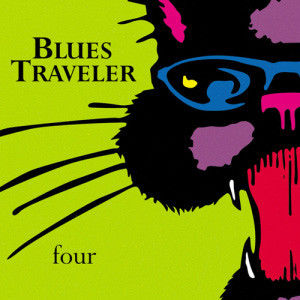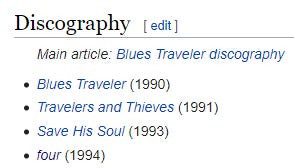In the landscape of 1980s rock, the idea of a harmonica virtuoso leading a band to mainstream success seemed improbable. Rock frontmen were typically envisioned as lean figures belting out power ballads, not necessarily masters of the mouth harp. But as the 90s ushered in an era of alternative music, the rules began to bend. Enter Blues Traveler and their charismatic Blues Traveler Lead Singer, John Popper. By 1994, their hit single “Run-Around” dominated airwaves, a catchy, largely acoustic track driven by keys, subtle percussion, and, most notably, Popper’s electrifying harmonica solos and distinctive tenor vocals. For many, “Run-Around,” the opening track from their breakthrough album four, was their introduction to Blues Traveler and the unforgettable John Popper, hailing from Chardon, Ohio.
While Blues Traveler is a collaborative effort, it’s undeniable that John Popper, the band’s frontman, immediately captures attention. In a decade where lead singer archetypes were still prevalent – think of Chris Cornell’s iconic poses or Eddie Vedder’s introspective stage presence – Popper defied expectations. He was a larger-than-life figure with untamed hair, often sporting a vest strategically designed to hold his arsenal of harmonicas, each tuned to a different key. And Popper didn’t just play the harmonica; he attacked it with a fervor and skill comparable to Eddie Van Halen on guitar. Yet, unlike Van Halen’s seemingly replicable techniques, Popper’s harmonica mastery felt like a captivating illusion. His hands, seemingly too large for the instrument, produced a rich, distorted sound, characterized by breathtaking speed and precision. Popper’s signature staccato solos were not just displays of technical prowess; they were integral to the soulful, roots-infused essence of Blues Traveler’s music.
 John Popper of Blues Traveler performing live, showcasing his harmonica skills and stage presence.
John Popper of Blues Traveler performing live, showcasing his harmonica skills and stage presence.
For those unfamiliar, the album title four might seem misleading for a “new” band. In fact, by the time four was released, Blues Traveler already had three previous albums under their belt, a testament to their years of honing their craft. Their “overnight success” was years in the making. Beyond the ubiquitous “Run-Around,” four reveals a band that had fully matured. This depth is particularly evident in what this writer considers a standout track, “Look Around.”
“Look Around” is a song that resonates as timeless perfection. It embodies the kind of songwriting that inspires envy, particularly when considering John Popper’s vocal performance. Each lyric delivered by Popper feels profoundly significant. The song begins with a gentle melody, gradually building in intensity before reaching a powerful crescendo, which it sustains until the song’s final notes at 5 minutes and 41 seconds. Even if “Look Around” were the sole contribution of John Popper and Blues Traveler to music, it would be a legacy worthy of recognition. The raw emotion and introspective lyrics in this song are truly captivating:
And I don’t care
Buyer beware of me
Cause it might get rough
If you want peace then live alone
If you want to hide then find a stage
Each a brief but perfect home
To accommodate your rage
And sometimes
In the midst of all my crimes
I feel lost
Or have I lost enough
Remaining friends
Remind me as they say
It’s up to you
The things you throw away
These lyrics, coupled with Popper’s passionate delivery, had a formative impact on aspiring singers. As a teenager, the writer would drive around, volume cranked up, attempting to emulate Popper’s high notes, often losing their voice in the process. While other 90s vocalists like Adam Duritz of Counting Crows were also challenging, Popper’s vocals, with their robust and soulful quality, proved to be the most vocally demanding, yet rewarding to attempt.
Despite the commercial triumph of four, fueled by “Run-Around” and later “Hook,” Blues Traveler sometimes felt relegated to the realm of one-hit-wonders, perhaps unfairly grouped with bands like Hootie and the Blowfish or No Doubt in terms of perceived long-term value. The abundance of four albums in used record store bargain bins, often marked with discount stickers, contributed to this skewed perception. While personally cherishing the album, the writer admits to being subtly influenced by these external factors. However, bargain bin status is often a byproduct of massive sales, and four indeed sold over six million copies, largely thanks to its hit singles.
Great music, however, has a way of transcending fleeting perceptions. Approaching its 28th anniversary, four remains remarkably fresh. Even “Run-Around,” despite its 90s radio ubiquity that might have led to listener fatigue, sounds revitalized with time. Beyond the mega-hits, four is brimming with quality tracks.
“Hook” retains its infectious pop sensibility, an unlikely hit that still captivates. The blues-rock infused tracks on four have aged gracefully, but the album’s ballads are particularly enduring. “The Mountains Win Again” remains a perennial favorite, its chorus particularly powerful. Interestingly, the song’s structure and chorus resolution bear a subtle resemblance to Queensrÿche’s “Silent Lucidity,” a quirky connection perhaps, but one that surfaces with each listen.
 Blues Traveler in concert, with John Popper front and center playing harmonica, highlighting the band's dynamic stage presence.
Blues Traveler in concert, with John Popper front and center playing harmonica, highlighting the band's dynamic stage presence.
For those who may have stopped their four journey prematurely, “Just Wait,” positioned towards the album’s end, is a powerful ballad that underscores the band’s musical depth. As a perfect album closer, it precedes “Brother John,” a track that, while perhaps more aligned with Blues Traveler’s live jam band ethos, doesn’t quite match the preceding song’s impact as an album ender.
Experiencing Blues Traveler live at the Innings Festival in 2019 reignited a deep appreciation for the band. Their performance, including a cover of Tom Petty’s “Mary Jane’s Last Dance,” was a revelation. This live experience also brought to mind Blues Traveler’s exceptional cover of John Lennon’s “Imagine.” While acknowledging the original’s iconic status, Blues Traveler’s rendition, infused with their signature style and Popper’s vocal and harmonica prowess, is truly remarkable. Popper’s vocals soar, and his harmonica solo is a heart-wrenching display of soulful expression. It’s a cover that honors the original while boldly showcasing Blues Traveler’s unique musical identity, particularly the exceptional talent of their blues traveler lead singer, John Popper.
